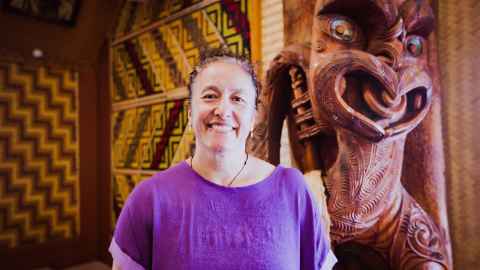Ngāpuhi doctor honoured for advancing Māori health
17 October 2019
Dr Matire Harwood has been recognised for excelling in a clinical research career that has improved Māori health in key areas such as asthma, stroke, heart disease and diabetes.

This is despite being a doctor in a busy general practice in South Auckland and an inspirational leader, teacher and mentor in hauora Māori.
For her outstanding leadership and contribution to Māori health, Dr Harwood (Ngāpuhi) was awarded the Health Research Council of New Zealand (HRC) Te Tohu Rapuora Award at the Royal Society Te Apārangi Honours ceremony on October 17.
Dr Harwood works at the Department of General Practice and Primary Healthcare in the School of Population Health, at the University of Auckland’s Faculty of Medical and Health Sciences, where she teaches and mentors 270-plus future doctors to practice in clinically and culturally safe ways. She is also a general practitioner at Papakura Marae Health Clinic, where 98 percent of patients are considered ‘high need’. While juggling these roles, she has become renowned for her work developing and testing community interventions for long-term conditions to improve Māori health outcomes and achieve equity.
It’s so important that Māori are involved in clinical trials, not just because we know that people who participate in trials do better, but because we need to show that any health intervention that we develop works for Māori and is not unintentionally increasing any inequities that exist.
Retaining her GP position in Papakura has greatly benefited her research, says Dr Harwood.
“I gave up general practice when I had kids, but I’ve been back now for six years and it definitely helps me to see why interventions to improve health outcomes are not reaching our Māori and Pacific communities. I can see the research in practice and spot when it’s not going to be translatable to the real world,” says Dr Harwood.
Dr Harwood was part of the New Zealand team that researched the effectiveness of a combination inhaler containing both preventative and reliever medication (known as the SMART regime) to treat Māori with asthma. Their findings, which were published in the Lancet Respiratory Medicine, showed the SMART regime significantly improved Māori asthma outcomes and led to PHARMAC funding the new medication. She also spearheaded the recruitment of Māori for a large clinical trial into the use of a polypill-based therapy to reduce health inequities in heart disease, which is yielding positive results.
“It’s so important that Māori are involved in clinical trials, not just because we know that people who participate in trials do better, but because we need to show that any health intervention that we develop works for Māori and is not unintentionally increasing any inequities that exist,” says Dr Harwood.
She was also instrumental in developing and testing a self-directed rehabilitation programme for Māori and Pacific peoples who have had a stroke. The success of this programme led to changes in national treatment guidelines and good practice following a stroke.
Currently, Dr Harwood is leading a $2.4 million pilot project involving 400 patients to improve outcomes for whānau with poorly controlled diabetes. The HRC-funded ‘Mana Tū’ project deploys clinicians called kaimanaaki in general practices across Auckland and Northland. Their key role is to support whānau to take charge of living with their long-term condition. Interim results indicate significant positive changes for those people enrolled in the project. As a result, district health boards and the Ministry of Health are looking to scale this intervention across other geographic locations and long-term conditions.
HRC Acting Chief Executive Dr Vernon Choy says Dr Harwood’s sustained contribution to Māori health and engagement with Māori communities and district health boards through the many facets of her work made her a standout candidate for the Te Tohu Rapuora Award.
“Matire served as an extremely valuable member of the HRC Board from 2009 to 2017, and she continues to do all that she can to support Māori health research and capacity development through her many leadership roles, including as a board member of the Expert Advisory Group of the New Zealand Health Research Strategy, Medical Research Institute of New Zealand and Waitematā District Health Board.
“She is one of the HRC’s most successful research grant awardees in Māori health and has more than 60 peer-reviewed publications. Her editorship of the bi-monthly newsletter Māori Health Research Review, which now has over 5,100 subscribers, is also helping health professionals better understand how to apply clinical data to their practice to ultimately improve Māori health outcomes.”
While eliminating Māori health inequities is a major challenge for New Zealand’s health system, Dr Harwood believes there is good reason to be hopeful of change.
“In the past, Māori health researchers had to often battle against closed doors – perhaps even locked doors – advocating for Māori health. I do feel like the door is a bit more open now and that people are more receptive to understanding the importance of why we do the work we do and of the rights as Māori to be part of the solution,” says Dr Harwood.
Media contact
Nicola Shepheard | Media adviser
DDI: 09 923 1515
Mob: 027 537 1319
Email: n.shepheard@auckland.ac.nz